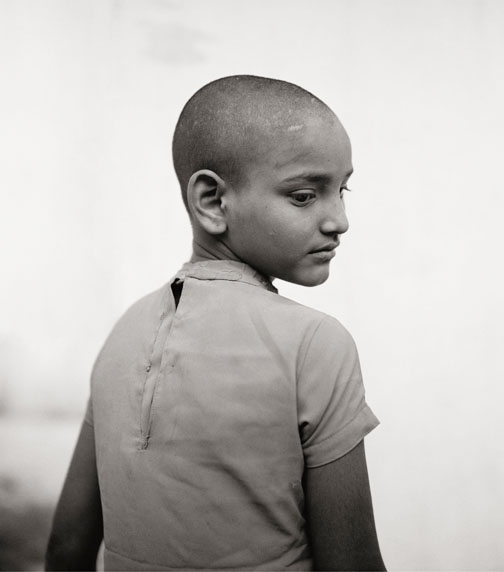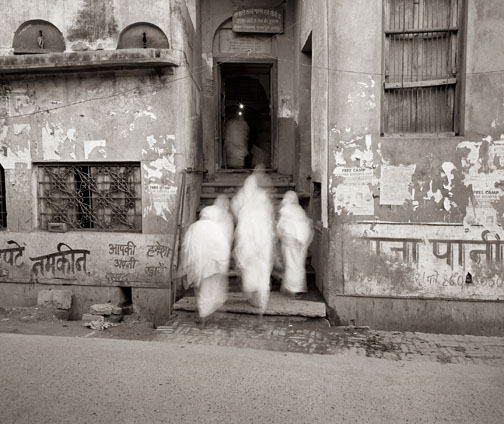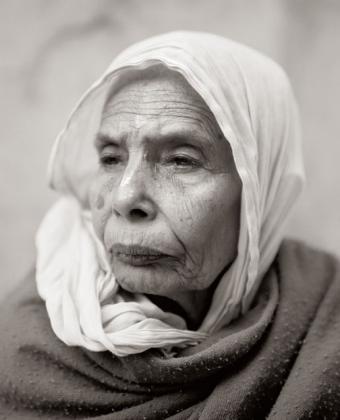PROVIDENCE, R.I. [Brown University] — Fazal Sheikh, 2005 winner of the MacArthur Foundation “genius” grant and the International Award from the Henri Cartier-Bresson Foundation, has worked for years with displaced people in Africa, South Asia, and the Americas. In books and installations, Sheikh combines his photographs with the personal testimony of his subjects, producing portraits of communities that address their beliefs and traditions as well as their political and economic problems.
Beginning March 27, Brown’s David Winton Bell Gallery will feature Sheikh’s recent projects Moksha (“Heaven,” 2005) and Ladli (“Beloved Daughter,” 2007), which address the situation of women in rural India. Sheikh will present a lecture on his work during a reception on Thursday, April 8. The reception begins at 5:30 p.m. and the lecture at 6:30.

Sheikh spends long periods with the people he photographs. As he explains, “It is one thing to photograph a group of people and another to try to understand them. For that you need time, and patience, and an innate respect for difference. ... At a time when traditional photographic coverage is often limited to a brief stopover and a search for sensational images, the need to take time and represent and understand the people whose lives and values are very different from our own is greater than ever.”
Moksha portrays the northern Indian holy city of Vrindavan, where dispossessed widows go to devote themselves to Krishna and seek moksha, or final release from the cycle of death and rebirth. The exhibition weaves cityscapes, interiors, street views, and portraits into a complex, cinematic vision. Ladli examines the lives of girls and young women who, despite progressive laws, are routinely denied their human, civil, and economic rights in parts of India that remain tradition-bound despite recent rapid economic growth.
Sheikh worked with a variety of non-governmental organizations in Delhi, Ahmedabad, and the Punjab to meet girls and young women who helped him understand the social practices that continue to imperil and limit the prospects of girls and women.
The Bell Gallery, 64 College St., is open Monday though Friday from 11 a.m. until 4 p.m. and 1 to 4 p.m. on Saturday and Sunday.
Beloved Daughters: Photographs by Fazal Sheikh and associated publications have been made possible by Jane A. Watkins. The exhibition was organized by the Princeton University Art Museum.

Fazal Sheikh
Fazal Ilahi Sheikh was born in 1965 in New York City. As a child he spent summers in Kenya, where his father was born and raised. Sheikh was named for his paternal grandfather, who immigrated to Nairobi in 1912 from what is today northern Pakistan.
Since graduating from Princeton University in 1987, Sheikh has worked with displaced communities across East Africa, in Pakistan, Afghanistan, Brazil, Cuba, and India. In 1994 he was named by The New York Times as one of 30 artists, 30 and under, most likely to change the culture for the next 30 years.
Sheikh was named a MacArthur Fellow in 2005. Additional fellowships include those from the J. William Fulbright Foundation, the National Endowment for the Arts, the New Jersey State Council on the Arts, the Nederlands Fotomuseum, Mondriaan Foundation, and the Mother Jones International Documentary Fund. He is the recipient of the International Henri Cartier-Bresson Grand Prize, the Prix d’Arles, the Infinity Award, the Leica Medal of Excellence, the Ruttenberg Award, and the Ferguson Award.
In 2001 he embarked on a series of book projects concerned with international human rights issues titled the International Human Rights Series (IHRS). He has published five books in addition to Ladli, and Moksha. They are Un Chameau Pour Le Fils (Photo Poche Societé, Actes SUD, 2005); A Camel for the Son (IHRS, 2001); Ramadan Moon (IHRS, 2001); The Victor Weeps (Scalo, 1998); and A Sense of Common Ground (Scalo, 1996).
Sheikh lives in Zurich, New York City, and Kenya.

